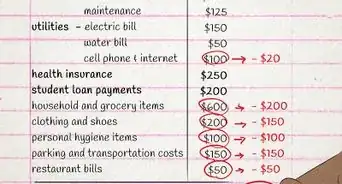This article was co-authored by Omar Ruiz, LMFT. Omar Ruiz is a Licensed Marriage & Family Therapist and the Owner of TalkThinkThrive, PLLC. With over 11 years of counseling experience, he specializes in helping couples resolve issues and restore intimacy. He has been featured in numerous publications, including The New York Times, Women’s Health, and WebMD. Omar holds a BS in Psychology from Howard University and an MS in Family Therapy from The University of Massachusetts Boston.
There are 7 references cited in this article, which can be found at the bottom of the page.
This article has been viewed 29,811 times.
In this day and age, people often believe they deserve only the best or that they are owed something. Unfortunately, this type of thinking can also make its way into marriages. Having a spouse who thinks you should bow down to them is not only frustrating, but can make you want to leave your marriage. You can get past these attitudes of entitlement, however, once you understand why you may have feelings of entitlement, or why your spouse has these feelings. Then, together, you can come up with plan that works for the both of you.
Steps
Recognizing Your Own Sense of Entitlement
-
1Ask yourself if you think showing love equals deserving love. Entitlement is all about believing that because you do something, you are owed something in return. Do you feel that you care for your spouse a considerable amount and deserve the same amount of love and care in return? If so, you feel entitled to getting exactly what you give.
- Hopefully, you put care and love into a relationship because you feel and know it is the right thing to do. If you do it simply so that you’ll get it back, you’ll only end up disappointed. This mentality will likely result in you feeling what you get back is inadequate compared to what you put in.
- Remember—no one is entitled to anything in a relationship, especially when it comes to sex. Intimacy is a mutually beneficial experience that should revolve around both partners' needs and wants—not just one.
-
2Question if your work ethic makes you feel entitled. It’s common and natural to want a “thank you” when you support your family. Perhaps you expect it because you put in long hours at the office every day. Maybe because you take care of the home and the kids, you think you deserve an attitude of gratitude from your spouse.
- Feelings of entitlement don’t necessarily just come in the form of wanting a “thank you.” One spouse may believe they deserve presents or even sex because of what they do. Entitlement refers to feeling that you are owed something, no matter what it is. Some spouses take advantage of this and hold it above the other spouse’s head, particularly in the case of sex.[1]
Advertisement -
3Look at what you’ve given up for your spouse and family. You or your spouse may believe that the other is indebted to them because of sacrifices they’ve had to make during the course of your relationship. Sacrifices are inherent in all relationships--marriages, parent-child relationships, and friendships alike. Comparing sacrifices will only lead to resentment and become a burden to your marriage.
- If you’ve given up your career to stay home with the kids, you may think your spouse owes you because of this. Perhaps you moved away from your family to be with your spouse. As a result, you may have a sense of entitlement.
-
4Consider your social group and their impact on your marriage. As hard as it is to swallow, your friends could be contributing to the sense of entitlement felt in your marriage. Like the old saying goes, "birds of a feather flock together." It may be time to assess the opinions, ideas, and beliefs of your social group to determine how they are factoring into the imbalance happening in your marital relationship.
- For instance, you could be listening to your friends who tell you that your spouse not going above and beyond for an anniversary or birthday is a bad sign. So, you pressure them to spend excess money on an extravagant gift or vacation that you couldn't actually afford.
- If the ideals of your friends or acquaintances are impacting your marriage, you may need to learn how to tune out their feedback, or get some distance altogether.[2]
Addressing Your Spouse’s Entitlement
-
1Ask your spouse why they feel entitled. You can speculate all you want, but you’ll never get to the bottom of why your spouse feels they are owed something unless you ask. Understanding why your spouse feels this way may give you insight to their behavior and make you better understand it. The key to getting your other half to open up is to stay respectful and to avoid negative comments about how they feel.
- Say to your spouse, “I feel like you believe I owe you something or that you are entitled to a certain behavior or action. Am I right? If so, can you tell me why you think that?” Coming from a positive place that is genuinely concerned about your marriage will encourage your spouse to be forthcoming with their thoughts and how they feel.[3]
-
2Talk to your spouse about what they want. Learning exactly what your spouse feels they are entitled to can help you understand their feelings. It could be that they just want acknowledgement of their efforts. It may be that they simply want some alone time because of how hard they work. Once you get this out in the open, you may be able to come to an arrangement that makes both of you happy.
- You could say, “What do you need that I’m not giving you?” Opening the lines of communication in a way that says you want to help, rather than coming off as defensive or critical, can make your spouse more receptive to talking openly with you.
-
3Seek the help of a therapist. You may feel more comfortable having a third party present when you try to talk to your partner about your or their sense of entitlement. Depending on your partner, they may be more open when a person is around, or they may shut down. You’ll need to take this into consideration if you go with this option.
- Don’t make going to a therapist a surprise for your partner. Simply showing up at the office and telling your spouse you’re going to therapy is a surefire way to cause a big fight. Instead, say, “I think we have some entitlement issues we need to work on. We haven’t been able to figure out the root of the problem on our own, so I was hoping you would agree to speak with a therapist and see if they can help us.”[4]
- Try to present going to a couples' therapist as a benefit for your relationship, rather than pinning it on your spouse's behavior.
Developing a Plan That Works
-
1Agree to meet each others’ expectations. Work out a plan with your partner about how you can both fulfill each other’s needs. However, only do what you feel comfortable with. If your spouse wants you to appreciate them with acts that you don’t want to engage in, speak up and come up with an alternative. Similarly, tell your spouse what you would like done to make you feel appreciated.
- It's important to create a balance between your individual needs. For instance, maybe your spouse really values "me time" and enjoys having time to themselves. Taking their "me time" away from them could disrupt that balance.
- Consult with a marriage counselor for help if you are unable to come up with tokens of appreciation that you both feel comfortable with. An outsider looking in may be able to think of something neither of you can, since you are both too involved.
-
2Let go of selfishness. If you are the person who believes they are entitled to certain treatment from your spouse, you’ll need to let go of what you feel. It’s understandable to want your spouse to be kind and caring, but to demand that they constantly owe you is inconsiderate and a definite way to end your marriage.
- Understand that you aren’t entitled to anything from your spouse. What’s more, only doing things for your spouse because you want them to “owe” you isn’t productive or beneficial to your marriage.[5]
-
3Perform selfless acts of kindness. If you want the status of your marriage to improve, it's time for you to get off your high horse. Start doing acts of kindness for your spouse for the simple pleasure of serving them—not to get anything in return. Try to incorporate one small way to serve them into each day.
- For example, you might ask your spouse, "Is there anything I can do that would make your day easier?" You can consider laying out their work clothes, buying them a special treat, or watching what they want on TV. This isn't done to get anything back, but simply to make them smile and feel loved and appreciated.
-
4Stop keeping score. A surefire way to spoil the satisfaction in your marriage is by keeping a running tally of who did what for whom. By keeping score, you and/or your partner are welcoming negativity and trust issues into the marriage. If score-keeping is a variable affecting your relationship, make the commitment to let bygones be bygones.
- Throw away your tally sheet. Cut your partner some slack and try something new. Instead of keeping up with what they did wrong, search for things that they are doing right. This allows you to create a positive self-fulfilling prophecy in your relationship. You will see more positives, and, as a result, you will experience greater marital satisfaction.[6]
-
5Compromise. Some say that comprise is the secret to a long-lasting relationship. One of the best ways to keep your marriage happy is to simply work out a deal with your spouse. You may not fully agree with what they want, and vice versa. However, putting your pride aside and compromising can help you to both become happy and allow your marriage to become stronger.
- The best route to successful compromise requires that each person bend a little to make the marriage work. Determine how much an issue means to you and then discuss with your spouse how you can each make sacrifices to meet in the middle.
- For instance, you might take turns choosing a restaurant for dinner rather than always making the executive decision. You might get your spouse's input on reasonable punishments for your child instead of making the call on your own.
-
6Learn to differentiate between entitlement and genuine need. The line between what you or your spouse wants (i.e. entitlement) in your marriage versus what is legitimately needed can get murky. It's best to keep an open dialogue with your partner, and an open mind within yourself, to prevent your wants from getting confused with your needs.
- A healthy relationship involves positive communication between partners in which they both can safely discuss their opinions, thoughts, feelings, and dreams, respect for one another as individuals, respect for one another's right to privacy, ongoing support and compassion from your partner, and the flexibility to compromise.[7]
- If any of these staples are missing, your relationship may be in jeopardy. Other desires not listed here may need to be discussed on a case-by-case basis depending on your individual preferences and expectations.
Expert Q&A
-
QuestionWhy do married couples lose intimacy?
 Omar Ruiz, LMFTOmar Ruiz is a Licensed Marriage & Family Therapist and the Owner of TalkThinkThrive, PLLC. With over 11 years of counseling experience, he specializes in helping couples resolve issues and restore intimacy. He has been featured in numerous publications, including The New York Times, Women’s Health, and WebMD. Omar holds a BS in Psychology from Howard University and an MS in Family Therapy from The University of Massachusetts Boston.
Omar Ruiz, LMFTOmar Ruiz is a Licensed Marriage & Family Therapist and the Owner of TalkThinkThrive, PLLC. With over 11 years of counseling experience, he specializes in helping couples resolve issues and restore intimacy. He has been featured in numerous publications, including The New York Times, Women’s Health, and WebMD. Omar holds a BS in Psychology from Howard University and an MS in Family Therapy from The University of Massachusetts Boston.
Licensed Marriage & Family Therapist Each case is different, so you both need to take a look inward. The disconnect could look as though there's less talking, there's less initiative to be intimate, there's less conversations or just less of being around together. Try to evaluate the circumstances that you guys are in so you can find your answer!
Each case is different, so you both need to take a look inward. The disconnect could look as though there's less talking, there's less initiative to be intimate, there's less conversations or just less of being around together. Try to evaluate the circumstances that you guys are in so you can find your answer! -
QuestionHow do you fix a sexless marriage?
 Omar Ruiz, LMFTOmar Ruiz is a Licensed Marriage & Family Therapist and the Owner of TalkThinkThrive, PLLC. With over 11 years of counseling experience, he specializes in helping couples resolve issues and restore intimacy. He has been featured in numerous publications, including The New York Times, Women’s Health, and WebMD. Omar holds a BS in Psychology from Howard University and an MS in Family Therapy from The University of Massachusetts Boston.
Omar Ruiz, LMFTOmar Ruiz is a Licensed Marriage & Family Therapist and the Owner of TalkThinkThrive, PLLC. With over 11 years of counseling experience, he specializes in helping couples resolve issues and restore intimacy. He has been featured in numerous publications, including The New York Times, Women’s Health, and WebMD. Omar holds a BS in Psychology from Howard University and an MS in Family Therapy from The University of Massachusetts Boston.
Licensed Marriage & Family Therapist Evaluate your situation and have a transparent conversation about your individual needs and what you would like from your partner. Then, listen and try to understand whether or not that is a feasible request. Remember to take care of your partners needs so you foster a romantic setting for both of you to engage in sex.
Evaluate your situation and have a transparent conversation about your individual needs and what you would like from your partner. Then, listen and try to understand whether or not that is a feasible request. Remember to take care of your partners needs so you foster a romantic setting for both of you to engage in sex.
References
- ↑ http://psychcentral.com/lib/10-reasons-you-cant-say-how-you-feel/
- ↑ http://www.focusonthefamily.com/marriage/strengthening-your-marriage/why-your-friends-matter-to-your-marriage
- ↑ https://www.psychologytoday.com/blog/fulfillment-any-age/201411/19-ways-tell-if-you-expect-too-much-your-partner
- ↑ http://www.familylife.com/articles/topics/marriage/staying-married/resolving-conflict/6-steps-for-resolving-conflict-in-marriage
- ↑ http://www.mindbodygreen.com/0-6555/7-Ways-to-Be-Less-Selfish.html
- ↑ https://www.psychologytoday.com/blog/fulfillment-any-age/201603/do-you-keep-score-in-your-relationships
- ↑ http://www.loveisrespect.org/healthy-relationships/








































































